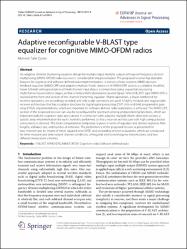Adaptive reconfigurable V-BLAST type equalizer for cognitive MIMO-OFDM radios
Özet
An adaptive channel shortening equalizer design for multiple input multiple output-orthogonal frequency division multiplexing (MIMO-OFDM) radio receivers is considered in this presentation. The proposed receiver has desirable features for cognitive and software defined radio implementations. It consists of two sections: MIMO decision feedback equalizer (MIMO-DFE) and adaptive multiple Viterbi detection. In MIMO-DFE section, a complete modified Gram-Schmidt orthogonalization of multichannel input data is accomplished using sequential processing multichannel Givens lattice stages, so that a Vertical Bell Laboratories Layered Space Time (V-BLAST) type MIMO-DFE is realized at the front-end section of the channel shortening equalizer. Matrix operations, a major bottleneck for receiver operations, are accordingly avoided, and only scalar operations are used. A highly modular and regular radio receiver architecture that has a suitable structure for digital signal processing (DSP) chip and field programable gate array (FPGA) implementations, which are important for software defined radio realizations, is achieved. The MIMO-DFE section of the proposed receiver can also be reconfigured for spectrum sensing and positioning functions, which are important tasks for cognitive radio applications. In connection with adaptive multiple Viterbi detection section, a systolic array implementation for each channel is performed so that a receiver architecture with high computational concurrency is attained. The total computational complexity is given in terms of equalizer and desired response filter lengths, alphabet size, and number of antennas. The performance of the proposed receiver is presented for two-channel case by means of mean squared error (MSE) and probability of error evaluations, which are conducted for time-invariant and time-variant channel conditions, orthogonal and nonorthogonal transmissions, and two different modulation schemes.

















